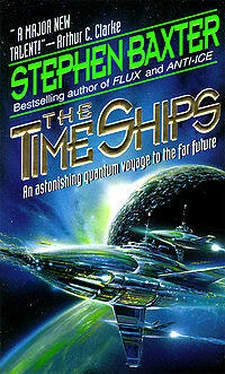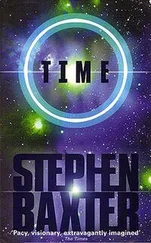“I emerged onto the same dismal beach, but now I saw a swarm of the centipede-things, which clambered heavily over each other, their cases scraping. They had a multitude of feet on which they crawled, looping their bodies as they advanced. And in the middle of this swarm I saw a mound — low and bloody — and I thought of the sad kangaroo-beast I had observed before.
“I could not bear this scene of butchery! I pressed at my levers, and passed on through a million years.
“Still that awful beach persisted. But now, when I turned from the sea, I saw, far up the barren slope behind me, a thing like an immense white butterfly which shimmered, fluttering, across the sky. Its torso might have been the size of a small woman’s, and the wings, pale and translucent, were huge. Its voice was dismal — eerily human — and a great desolation settled over my soul.
“Then I noticed a motion across the landscape close to me: a thing like an outcropping of Mars-red rock which shifted across the sand towards me. It was a sort of crab: a thing the size of a sofa, its several legs picking their way over the beach, and with eyes — a grayish red, but human in shape — on stalks, waving towards me. Its mouth, as complex as some bit of machinery, twitched and licked as the thing moved, and its metallic hull was stained with the green of the patient lichen.
“As the butterfly, ugly and fragile, fluttered above me, the crab-thing reached up towards it with its big claws. It missed — but I fancy I saw scraps of some pale flesh embedded in that claw’s wide grasp.
“As I have since reflected on that sight,” I told Nebogipfel, “that sour apprehension has confirmed itself in my mind. For it seems to me that this arrangement of squat predator and fragile prey might be a consequence of the relationship of Eloi and Morlock I had observed earlier.”
“But their forms were so different: the centipedes, and then the crabs—”
“Over such deserts of time,” I insisted, “evolutionary pressure is such that the forms of species are quite plastic — so Darwin teaches us — and zoological retrogression is a dynamic force. Remember that you and I, — and Eloi and Morlock — are all, if you look at it on a wide enough scale, nothing but cousins within the same antique mud-fish family!”
Perhaps, I speculated, the Eloi had taken to the air in that species’ desperate attempt to flee the Morlocks; and those predators had emerged from their caves, abandoning at last all simulation of mechanical invention, and now crawled across those cold beaches, waiting for a butterfly-Eloi to tire and fall from the sky. Thus that antique conflict, with its roots in social decay, had been reduced, at last, to its mindless essentials.
“I traveled on,” I told Nebogipfel, “in strides a millennium long, on into futurity. Still, that crowd of crustaceans crawled among the lichen sheets and the rocks. The sun grew wider and duller.
“My last stop was thirty million years into the future, where the sun had become a dome which dominated a wide arc of sky. Snow fell — a hard, pitiless sleet. I shivered, and was forced to tuck my hands into my armpits. I could see snow on the hilltops, pale in the star-light, and huge bergs drifted across the eternal sea.
“The crabs were gone, but the vivid green of the lichen mats persisted. On a shoal in the sea, I fancied I saw some black object, which I thought flopped with the appearance of life.
“An eclipse — caused by the passage of some inner planet across the sun’s face — now caused a shadow to fall over the earth. Nebogipfel, you may have felt at ease in that country — but a great horror fell upon me, and I got off the machine to recover. Then, when the first arc of crimson sun returned to the sky, I saw that the thing on the shoal was indeed moving. It was a ball of flesh-like a disembodied head, a yard or more across, with two bunches of tentacles which dangled like fingers across the shoal. Its mouth was a beak, and it was without a nose. Its eyes — two of them, large and dark — seemed human…”
And even as I described the thing to the patient Nebogipfel, I recognized the similarity between this vision of futurity, and my odd companion during my most recent trip through time — the floating, green-lit thing I had called the Watcher. I fell silent. Could it be, I mused, that my Watcher was no more than a visitation to me, from the end of time itself?
“And so,” I said at last, “I clambered aboard my machine once more — I had a great dread of lying there, helpless, in that awful cold — and I returned to my own century.”
On I whispered, and the huge eyes of Nebogipfel were fixed on me, and I saw in him remnant flickers of that curiosity and wonder which characterizes humankind.
Those few days in space seem to have little relation to the rest of my life; sometimes the period I spent floating in that compartment is like a momentary pause, shorter than a heartbeat in the greater sweep of my life, and at other times I feel as if I spent an eternity in the capsule, drifting between worlds. It was as if I became disentangled from my life, and able to look upon it from without, as if it were an incomplete novel. Here I was as a young man, fiddling with my experiments and contraptions and heaps of Plattnerite, spurning the opportunity to socialize, and to learn of life, and love, and politics, and art — spurning even sleep! — in my quest for an unattainable perfection of understanding. I even supposed I saw myself after the completion of this inter-planetary voyage, with my scheme to deceive the Morlocks and escape to my own era. I still had every intention of carrying that plan through — you must understand — but it was as if I watched the actions of some other, littler figure than I was.
At last I had the idea that I was becoming something outside not only the world of my birth — but all worlds, and Space and Time as well. What was I to become in my own future but, once again, a mote of consciousness buffeted by the Winds of Time?
It was only as the earth grew perceptibly nearer — a darker shadow against space, with the light of the stars reflected in the ocean’s belly — that I felt drawn back to the ordinary concerns of Humanity; that once again the details of my schemes — and my hopes and fears for my future — worked their life-long clockwork in my brain.
I have never forgotten that brief inter-planetary interlude, and sometimes — when I am between waking and sleeping — I imagine I am again adrift between Sphere and the earth, with only a patient Morlock for company.
Nebogipfel contemplated my vision of the far future. “You said you traveled thirty million years.”
“That or more,” I replied. “Perhaps I can recall the chronology more precisely, if—”
He waved that away. “Something is wrong. Your description of the sun’s evolution is plausible, but its destruction — our science tells us — should take place over thousands of millions of years, not a mere handful of millions.”
I felt defensive. “I have recounted what I saw, honestly and accurately.”
“I do not doubt you have,” Nebogipfel said. “But the only conclusion is that in that other History — as in my own — the evolution of the sun did not proceed without intervention.”
“You mean—”
“I mean that some clumsy attempt must have been made to adjust the sun’s intensity, or longevity — or perhaps even, as we have, to mine the star for habitable materials.”
Nebogipfel’s hypothesis was that perhaps my Eloi and Morlocks were not the full story of Humanity, in that sorry, lost History. Perhaps — Nebogipfel speculated — some race of engineers had left the earth and tried to modify the sun, just as had Nebogipfel’s own ancestors.
Читать дальше
Конец ознакомительного отрывка
Купить книгу









